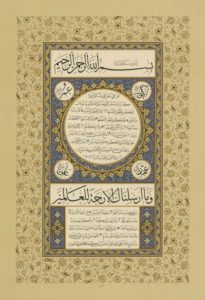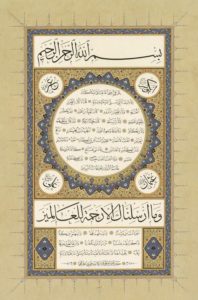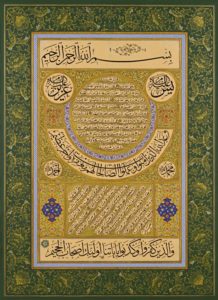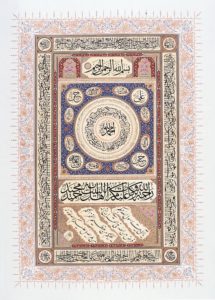Jamaluddin al-Ghumuqi al-Husayni
 I State of the Reality of Muhammad . He was a Master of Masters, a Light of Lights, and a Knower of Knowers. He was a Guide of this Order who took his power through his blood lineage to the Prophet , being asani and usaini by ancestry, and taking the spiritual power of the Order from the Prophet through Abu Bakr as-Siddiq (r) and Sayyidina `Ali (r).
I State of the Reality of Muhammad . He was a Master of Masters, a Light of Lights, and a Knower of Knowers. He was a Guide of this Order who took his power through his blood lineage to the Prophet , being asani and usaini by ancestry, and taking the spiritual power of the Order from the Prophet through Abu Bakr as-Siddiq (r) and Sayyidina `Ali (r).
He was born in the district of Kubu, of Ghazikumuk, in Daghestan in the year 1203 H./1788AD., on Thursday, the 16th Mu arram. From the first day he came to this world he was in a state of witnessing and he thus lived his whole life, from the time of his birth, in a state of unveiling.
He was a scholar in both exoteric knowledge and esoteric knowledge. He was known to speak more than fifteen languages including Arabic, Persian, Urdu, Pashtu, Hindi, Russian, Turkish, the Daghestani and Circassian dialects, and Armenian. He had memorized Qur’an by heart and memorized 775,000 adaths, both the correct and the false.
He was an encyclopedia of hadith and a reference in explanation of the Holy Qur’an. He mastered the Sciences of Fiqh (Jurisprudence) and Logic. He was a scientist and a mathematician. He had a particular mastery of the Science of Physics. He was a renowned homeopathic physician. In fact, there wasn’t any branch of science known at that time that he had not studied deeply. He was a very great Sufi and authored a book entitled “Adab al-Muridiyya fi-t-Tariqat an-Naqshbandiyya”, “The Rules of Conduct of the Murids in the Naqshbandi Tariqat.”
He was a Qu b in the time of his Shaykh and he occupied that station for forty years. His Shaykh, Shaykh Ismacal (q), showed him all kinds of secret knowledge important for the training and raising of his followers.
Already during the life of Shaykh Isma`il (q), Sayyid Jamaluddin al-Ghumuqi was a saint. During the lives of the two other great saints of Daghestan and khalifs of his Shaykh, Sayyidina Khas Muhammad and Shaykh Muhammad Effendi al-Yaraghi, he continued to be the saint carrying the main secret of the Naqshandi Order. However, only when his Shaykh, Shaykh Muhammad Effendi al-Yaraghi, passed away, was he given permission to become the Master of the Order.
He was tall and thin. His complexion was very white. His beard was very long and wide. His eyes were red. His voice was very soft and sweet.
When he was young, he was a student of scholars and Sufis in Daghestan. For a while, he was the private secretary of the Governor of the state of Ghazikumuk. He decided to leave that because, “Allah gave me power to see with two special eyes, the power to see into the Seven Heavens and to see through the Earth. I cannot work for an oppressor.” He left that job and directed himself to the Naqshbandi Order, which was flourishing at that time, preparing the people to fight the Russians. Later, when he was a Shaykh, he was the advisor and inspiration behind Shaykh Shamil’s armed resistance against the Russians, and also his father-in-law.
His knowledge of the Naqshbandi Order made people come from all around to listen to him. When people asked him why he left his high government position, he answered with the words quoted above. They were overwhelmed at his answer. In a short period of time he became very famous.
During the time of Shaykh Shamil, another governor, by the name of Arlar Khan, asked him to accept the position of mufti (religious authority). He refused, saying, “I will not work for oppressors.” Then the governor ordered him to take the position, but he ignored him and simply walked away. The governor then ordered that he be hung. Shaykh Jamaluddin stood with the rope around his neck and was about to be executed, when the governor came running to the balcony shouting, “Stop! Stop! Don’t hang him.” In full view of the people he then threw himself off the balcony and died in the street below. They immediately removed the noose from Sayyidina Jamaluddin’s neck and let him go. This was one of his miracles.
From His Teachings
He said,
“You must use your knowledge. If you don’t use it, it will be used against you.”
“The first step in the station of Unique Oneness is to keep the saying of the Prophet , ‘To worship Allah as if you are seeing Him.’”
“The worship of the Knower is better than the crowns on the heads of kings.”
“If the knowledge about which I am talking to you were from me, it would have vanished; but it is from Him, and since it is from Him, it never vanishes.”
“Among the deeds whose rewards no angel can see is Remembrance of God (Dhikrullah).”
“The best and the highest association is to sit with God in the State of Oneness.”
“Keep track of your hours, because they are going, never to return. Pity the one who is heedless. Connect your daily practices of dhikr one to another, like links in a chain; you will find a benefit from it. Don’t make your heart busy with the worldly life, because it will take the importance of the Hereafter from your heart.”
“The stories of pious people and saints are like battalions from Allah’s Army by means of which the states of murids are revived and the secret knowledge of Knowers is known. The proof of this is in His Holy Book, the Qur’an, when He said to the Prophet : “We will tell you stories of the Prophet who came before you to make your heart at peace” [11:120].
“Be in your heart with Allah, Almighty and Exalted, and be in your body with the people, because he who leaves people will leave the Group and he who leaves the Group will fall into ignorance. The one who would use his Secret to be with people will fall into tests and temptations and he will be veiled from the Presence of His Lord.”
“Allah has unveiled for His Servants the extent of their defects when He revealed that they had been created from clay. He showed them their lowliness when He said that they come from a sperm-drop. And He made them witness their helplessness and their weakness when He created the need to go to the bathroom.”
“Pride is the gravest danger for human beings.”
“The knowledge of Oneness is the specialty of the Sufis allowing them to differentiate between the Eternal and the transient.”
From His Miracles
It is said that Allah granted him two eyes in addition to those in his head and gave him added vision thereby. One eye was below his navel, the other one above his navel. When he was an infant, the women of Ghazikumuk used to come to see those two eyes.
Allah gave these two eyes spiritual power by which He would unveil whatever hidden knowledge was to be known: either Heavenly Knowledge or knowledge related to the spiritual beings of this world.
With the eye above his navel he could see the Heavenly Knowledge and was given the spiritual power to transport himself into the Divine Presence with complete vision, without any Self-Effacement. He was able to look at the Divine Secrets with complete self-awareness and speak about them to his followers. Whenever any question was asked by his murids about heavenly stations, he used to answer by first looking with Perfect Vision at the stations and then giving the answer.
The eye below the navel he used for any question concerning this world and the spiritual beings known as Jinn. He was very famous for telling his followers all that was needed about their future, their present and their past. The lineages and the relationships between his followers and their ancestors were unveiled to him like a book. He could satisfy anyone asking about his lineage because he was able to recall his ancestors one by one.
One time he was sitting with his followers eating apples. Suddenly, he took the apples from the plate and threw them up in the air. The murids were surprised at this seemingly childish action, especially in light of the Sufi principle of strict avoidance of all that qualifies as what is useless and of no concern (ma la ya`ni). He looked at them and said, “Don’t look at actions and misinterpret them, that would be a big error on your part. The meaning of what I have done will be known after four hours, when a murid will come from another village and you will have the explanation.”
As predicted, a man came and said, “O my Shaykh, my brother died a short while ago.” The Shaykh said, “That is what happened. Now tell them exactly when he died.” He said, “He died four hours ago.” The Shaykh explained, “I saw the Angel of Death, `Izra’il (as), coming to take my follower’s soul with anger and punishment. I threw that apple up and with that action I stopped `Izra’il . I told him to go back to Allah, Almighty and Exalted, and tell Him that Sayyid Jamaluddin is asking that He change the death of that servant from a bad ending to a good ending. On `Izra’il’s way back down with the answer that Allah had changed the destiny from punishment to mercy, I threw the second apple up and told `Izra’il (as) that he should go and that I would take the soul of my murid myself. I was the one who took the soul out of his body in his last seven breaths.”
One time some visitors were on their way from Kazan to visit Sayyidina Jamaluddin (q). On the way they passed by the home of an old lady named Salahuddin `Ayesha. She said, “When you pass by the Shaykh, ask him to give me initiation, as I am not able to go to him myself.” At the conclusion of their meeting with Shaykh Jamaluddin, they asked him for a daily devotion (wird) for Salahuddin `Ayesha. He said, “Take her this piece of cloth.” They brought her the piece of cloth, which the Shaykh had given them. She took the piece of cloth, opened it and looked at it saying, “I understand, I understand!” and she put it on top of her head. Then she left and some time later, came back with a pitcher of milk. She said, “Take this back to the Shaykh.” When they returned to the Shaykh and gave him the milk, he was in severe pain, because he had been tortured by the governor. He drank the milk and said, “Alhamdulillah, I am healed by means of this milk, which the lady has milked from deer. She is very wise. She understood me immediately. I had put a burning coal in the piece of cloth and the cloth didn’t burn. When I sent it to her, she understood that to hold this tariqat is to hold a burning coal. She took the coal and she sent me the milk. The milk is a sign of purity of the heart. So she sent me an answer saying, “I am accepting the difficulty of this way, and I am dedicating the purity of my heart to you.” Then the people of the village went back to the lady and told her what the Shaykh had said. She related, “When I received the charcoal, two deer appeared at my door. Never before had I seen such a thing. I immediately knew that I should milk them and send the milk to the Shaykh.”
One time Sayyid Jamaluddin al-Ghumuqi (q) was with his followers in the big mosque of the city praying the night prayer in congregation. When the prayers were finished, everyone went out and they locked the mosque from the outside. One person remained behind inside the mosque, hiding behind a pillar. His name was Orkallisa Muhammad, one of the best murids of Sayyid Jamaluddin (q). He was talking to himself and saying, ‘O Orkallisa Muhammad, now there is no one with you, you are alone. Defend yourself.” And he answered himself, “How can I defend myself? I am the worst person that Allah has created on the face of the Earth. To prove it, I swear an oath that if what I say is not what I honestly believe, then may my own wife be aram to me!” He didn’t know that his Shaykh was also hiding himself in the mosque and observing him. The Shaykh looked into his heart. He saw that in his heart he truly believed himself to be the worst person in creation.
Sayyid Jamaluddin (q) revealed himself, laughing and saying, “Orkallisa come here.” The latter was very surprised to see his Shaykh because he thought he was alone. The Shaykh told him, “You are right and you are also loyal and sincere.” As soon as he heard this, Orkallisa Muhammad floated up and hit his head on the ceiling of the mosque. He came down and floated up and came down again. This happened seven times. When the murid is cleansed of this dunya his soul will lift him up and he will fly like a bird.
Then Shaykh Jamaluddin told him, “Sit,” and he sat. The Shaykh was pointing with his index finger to the heart of Orkallisa Muhammad with a circular motion. As he was rotating his finger he was opening his heart, not to the Divine Presence, but to the secrets hidden already in his own heart. What he opened up to him were the six levels that must be opened to the seeker in order to set foot on the first step in the Way. These are: the Reality of Attraction (haqiqat al-jadhba), the Reality of Receiving Heavenly Revelation (haqiqat al-fayd), the Reality of Directing the Heart’s Power to Someone (haqiqat at-tawajjuh), the Reality of Intercession (haqiqat at-tawassul), the reality of Guidance (haqiqat al-irshad), and the Ability to move in Space and Time in one Moment (haqiqat at-tayy).
These six powers that he opened to him are the First Major Step on the Sufi Path. As he opened these six powers, he was able to take him to the State of Witnessing. In that state of vision he saw himself sitting with 124,000 white birds encircling him. One large green bird flew to the middle. After that vision the white birds disappeared and in their places there appeared the spirituality of 124,000 saints. Then the green bird disappeared and there appeared the spiritual form of Sayiddina Muhammad . The Prophet said, “I am testifying that he has reached the state of Perfection and now you can depend on him. Give him the secret of the Naqshbandi Order. Then Sayidd Jamaluddin poured from his heart into the heart of Orkallisa Muhammad secrets and knowledge of which he had never dreamed. He said to his Shaykh, “O my Shaykh, do these things exist in tariqat?” He replied, “Yes, my son, and that is only the Begining of the Way.”
It is said that the secret of his Shaykh could be seen in Orkallisa Muhammad. He would go up on the minbar (pulpit) on Friday and he would clap his hands and say, “O People cry!” and they would all begin crying. Then he would clap his hands and say, “Laugh!” and they would laugh. Then he would make a duca (invocation) saying, “O Allah they are crying in repentance and asking forgiveness. Forgive them. And they are laughing at the pleasure of your mercy!” Then he would clap a third time and say, “Are you accepting the Naqshbandi Sufi Order to be your Order?” and they would say, “Yes.” Then he would ask them, “Do you accept to repeat 5000 times, ‘Allah,’ by tongue and 5000 times, ‘Allah,’ in the heart?” and they would answer, “Yes.” By this method he spread the Naqshbandi Order all over the land of Daghestan, Kazan, Southern Russia and among the soldiers of Imam Shamil.
His Jihad
Shaykh Jamaluddin al-Ghumuqi al-Husayni (q) was deeply involved in directing the war against the Russians. He was fighting to keep the teaching of spirituality strong in Russia, as it had been in previous times. He supported Imam Shamil in his fight against Russia for nearly 40 years. His soldiers consisted solely of Naqshbandi murids, as he allowed no other affiliation in his army. Leslie Blanch writes the following about their relationship in her book “Sabres of Paradise”:
“Shamil was obeying him [Shaykh Jamaluddin] long after he [Shamil] had become the imperious ruler who would brook no word of criticism elsewhere. With his tutor, Shamil was from the first disciplined and studious. He learned Arabic and studied Arabic literature, philosophy and theology, progressing towards the complicated Sufi doctrines which, since religious evolution is a fundamental principle of Sufism, included a comparative study of Adam, Abraham, Moses, Jesus and Muhammad. It was apparent that this was no ordinary student, and Jamaluddin sought to prepare his charge for that great destiny, which, according to some, was already written on his brow.” [p. 54-55]
“He [the second Imam of Daghestan] rose quickly in the hierarchy of the madrasah (religious school), to become one of the inner circle of murids. However much they planned action, a Holy War, still they drew their spiritual inspiration from the Sufi teachings of [Jamaluddin].”
“Imam Shamil was married to Mullah Jamaluddin’s daughter Zaydat.” [p. 211]
“Imam Shamil in general spent the rest of the day in meditation or prayer or in theological discussions with his spiritual teacher, Mullah [sayyid] Jamaluddin.” [p. 352]
When Shaykh Shamil was defeated and taken prisoner by the Russians in 1279 H. / 1859 CE., Shaykh Jamaluddin decided that the people of Daghestan would emigrate en masse from Daghestan to Istanbul in Turkey. Once the decision was made, the people of Daghestan, Kazan, Chechenia, Kazakhstan, Armenia, Azerbaijan and other areas, all began to prepare for migration out of Russian-held lands. They went to Turkey and Arab countries among other places.
Shaykh Shamil was released by the Russians on condition that he would swear never to resume fighting against them. He went to Pilgrimage and was given a hero’s welcome at Makkah, where it is said that he was made to pray on top of the Ka`ba in order for everyone to benefit from seeing him. He died in Madina and was buried in the cemetery of the Companions, al-Baqi`.
Migration
Shaykh Jamaluddin (q) moved to Istanbul, accompanied by his family and the family of Shaykh Shamil. There they lived in the district of Uskudar, on the Asian side of Istanbul. From there he spread the Naqshbandi Sufi teachings all over Turkey.
At the time all the houses were made of wood. One day a great fire swept through the city of Uskudar. People fled their houses to save themselves. They came to him, urging him to leave. He said very calmly, “There is no way that I will leave, because my house will not burn up. This house was built from money which was earned by my own hands. Never will a house burn which was built with pure, lawful money.” The entire district burnt, but his house remained untouched by flames. That house has been preserved until today, and is very famous.
His behavior with his family and with his murids was always impeccable. He kept the best of manners with them. He never reacted to the complaints or objections of his family. He never objected to or criticised his murids. He always tried to make them happy.
One day, shortly before his death, he called his wife and his daughter. He said, “Today I have done a great work, and it has taken all my power and left me very weak. When you read the newspaper, you will see that a big ship ran aground in the Bosphorus. No one died and they were saved by an unknown person. I was that unknown person, and you will hear about it.” Then he passed away. The next day the daughter, with astonishment and tears, read the story in the newspapers, about how a great ship had grounded and how an unknown person had saved all the people on board. That newspaper is still kept by his descendants.
He died in 1285 H./1869 C.E. on the 5th of Shawwal, at the age of 80 years. He was buried in Istanbul, near the family of Imam Shamil, in Uskudar.
Some time after his death and burial, the location of his grave was lost, and no one was able to find it. It was not discovered again for many years. Shaykh Sharafuddin (q), who came forty years after his passing, was the one who rediscovered his grave. When he was living in Rashadiya, 150 miles from Istanbul, he saw in a vision that he was being brought to Uskudar. He was brought to a cemetery and a person appeared to him dressed in a green cloak. He said, “I am Shaykh Jamaluddin. You have to reveal the location of my grave.” Shaykh Sharafuddin asked, “How will I know your grave?” He said, “This is the graveyard of Karaja Ahmad, a saint who is buried here,” pointing to a place a short distance away. Then he said, “My son, try your best to discover the location of my grave.” The next day Shaykh Sharafuddin wrote to people in Istanbul, and told them to dig in such and such place. They dug it up and found the grave, and they found the headstone, marked with his name.
Shaykh Jamaluddin (q) passed the Secret of the Golden Chain of the Naqshbandi Order to Sayiddina Abu Ahmad as-Sughuri (q).


 I never ceased to stand,
I never ceased to stand, I weep and he makes me happy.
I weep and he makes me happy. I spoke about Myself.
I spoke about Myself. He praises me, and I praise Him; He serves me, and I serve Him; By my existence I affirm Him; And by my determination I deny Him; It is He who knows me, when I deny Him; Then I discover Him and contemplate Him.
He praises me, and I praise Him; He serves me, and I serve Him; By my existence I affirm Him; And by my determination I deny Him; It is He who knows me, when I deny Him; Then I discover Him and contemplate Him.